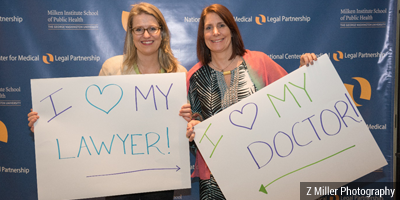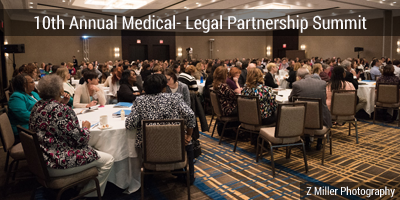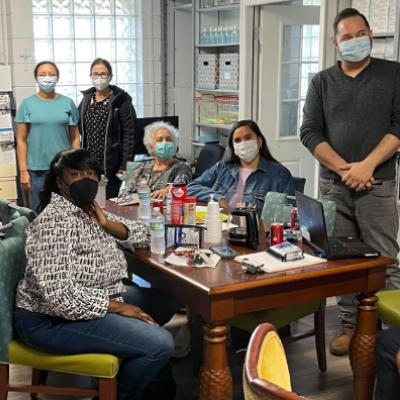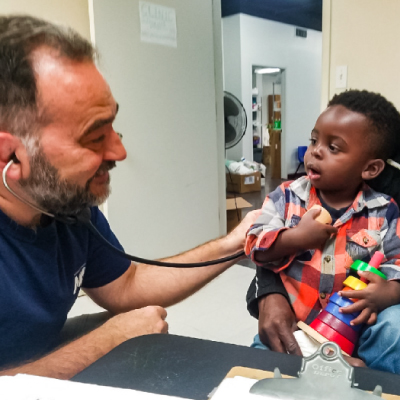- Who We Are
- Clinician Employment
- Publications
- Witness to Witness (W2W)
- El Premio Kugel & Zuroweste a la Justicia en la Salud
- Your Voice Matters: Photovoice Project
Sun, 10/11/2015 | by MCN Admin

By Sharena Hagins, National Center for Medical-Legal Partnership and Alexis Guild, Farmworker Justice
 As clinicians who treat migrant patients, you often see people whose health is affected by far more than biology – patients who have health issues because of unsafe housing and poor working environments. These patients may also be reluctant to seek medical treatment for fear their employers will retaliate, for lack of health insurance, or because of their immigration status. But even though you recognize these problems, treating them is often outside the scope of what you do. But what if there was a lawyer down the hall who could help?
As clinicians who treat migrant patients, you often see people whose health is affected by far more than biology – patients who have health issues because of unsafe housing and poor working environments. These patients may also be reluctant to seek medical treatment for fear their employers will retaliate, for lack of health insurance, or because of their immigration status. But even though you recognize these problems, treating them is often outside the scope of what you do. But what if there was a lawyer down the hall who could help?
This is exactly what is happening at 292 hospitals and health centers across the United States, where civil legal aid lawyers are embedded as part of the health care team to help doctors, nurses, and social workers treat the underlying social conditions often at the root of poor health. Together, these medical-legal partnerships help reverse denials of cash, food, and insurance benefits, prevent unlawful evictions, intervene when there is employment discrimination, and help with immigration status – all in the name of better health.
Getting legal help for one of these problems is often the final piece needed to make medical treatment work the way it is supposed to. As recently featured on PBS NewsHour, a child who had received a life-saving bone marrow transplant could not leave the hospital because his apartment had cockroaches, and it would have made him sicker to go home. It took doctors and lawyers to help him get well. And when the patients who were most frequently admitted to Lancaster General Hospital received help from its medical-legal partnership with housing and cash, and food and disability benefits, their health not only improved, but health care costs went down 45 percent.
 Farmworker medical-legal partnerships serving migrant communities face unique challenges, including staff turnover due to the seasonality of farm labor and concerns about the impact of a medical-legal partnership on existing relationships, which may require more innovative models. In California, for example, the Agricultural Workers’ Access to Health Project, a partnership between Salud Para La Gente and California Rural Legal Assistance, provides outreach, education, and access to legal and medical clinics for farmworkers who experience a work-related injury or illness.
Farmworker medical-legal partnerships serving migrant communities face unique challenges, including staff turnover due to the seasonality of farm labor and concerns about the impact of a medical-legal partnership on existing relationships, which may require more innovative models. In California, for example, the Agricultural Workers’ Access to Health Project, a partnership between Salud Para La Gente and California Rural Legal Assistance, provides outreach, education, and access to legal and medical clinics for farmworkers who experience a work-related injury or illness.
The ultimate goal of medical-legal partnership is that health-harming social conditions are treated as part of regular health care, that health care and civil legal aid are delivered side by side, and that we cease treating poor health and injustice as two separate problems.
Every year, more than 400 people from government, law, medicine, nursing, public health, and social work meet at the Medical-Legal Partnership Summit to talk about how integrating legal care into health care can help combat health-harming social conditions. Hosted by the National Center for Medical-Legal Partnership, it is a chance for programs to share and learn from their colleagues in the field.
The 11th annual Medical-Legal Partnership Summit, “Health is a Shared Value,” will be held April 6 – 8, 2016, in Indianapolis, Indiana. NCMLP is currently accepting workshop proposals through Friday, December 4, 2015. Click here to read the submission guidelines and to submit a proposal. Registration for the conference will open in early November.
RESOURCES
- The “Medical-Legal Partnership Toolkit” from the National Center for Medical-Legal Partnership provides more information about the MLP approach and a step-by-step guide to starting a program. Download the MLP Toolkit here.
- The “Medical-Legal Partnership Resource Guide for Farmworker-Serving Health Centers” augments the core MLP Toolkit by providing additional information for health care and civil legal aid organizations partnering for migrant and farmworker populations. It was developed by Farmworkers Justice and Health Outreach Partners. Download the Toolkit here.
Like what you see? Amplify our collective voice with a contribution.
Return to the main blog page or sign up for blog updates here.







